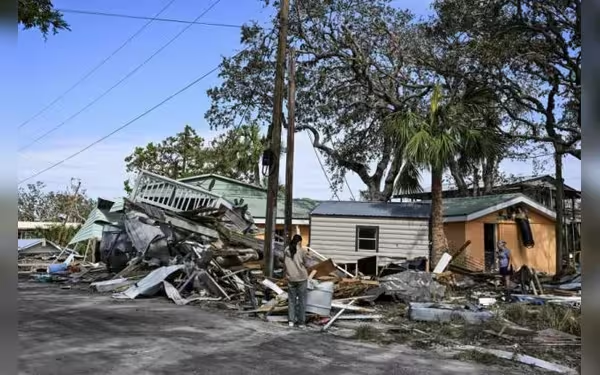Wednesday, October 16, 2024 04:26 PM
Long-Term Death Toll of Cyclones Underestimated, Study Reveals
- Long-term cyclone death toll may exceed official figures.
- Cyclones could account for five million deaths since 1930.
- Urgent need for better disaster response and preparation.
 Image Credits: urdupoint
Image Credits: urdupointA study reveals the long-term death toll from cyclones is vastly underestimated, highlighting the need for improved disaster response.
As the world grapples with the increasing frequency and intensity of tropical cyclones, a recent study has shed light on a startling reality: the long-term death toll from these natural disasters is significantly underestimated. While immediate fatalities from storms like Hurricane Helene and Typhoon Krathon capture headlines, the true impact of these cyclones extends far beyond the initial destruction. This research highlights the urgent need for a reevaluation of how we understand and respond to the aftermath of such catastrophic events.
The study, published in the esteemed journal Nature, reveals that the long-term death toll from tropical cyclones could be as much as 300 times greater than the official figures reported during the storms. For instance, Hurricane Helene claimed at least 155 lives in the southeastern United States, while Typhoon Krathon is expected to add to the toll in Taiwan. However, these numbers only scratch the surface of the devastation caused by these storms.
Researchers analyzed data from 501 tropical cyclones that struck the continental United States between 1930 and 2015. They focused on the number of excess deaths recorded in the 15 years following each storm. The findings were shocking: while the average number of deaths reported during individual storms was just 24, when considering indirect deaths in the years that followed, the average toll skyrocketed to between 7,000 and 11,000. This staggering figure suggests that cyclones may have contributed to as much as five million deaths over the 85-year period studied.
Moreover, the research indicates that cyclones could account for three to five percent of all deaths recorded in the affected areas along the US Atlantic coast. This revelation raises critical questions about how we prepare for and respond to these natural disasters. With climate change expected to intensify the frequency and severity of tropical cyclones, it is imperative that communities in vulnerable regions receive adequate support and resources to mitigate the long-term impacts.
The findings of this study serve as a wake-up call for governments, policymakers, and communities worldwide. It is essential to recognize that the effects of tropical cyclones extend far beyond the immediate aftermath. By understanding the full scope of their impact, we can better prepare for future storms and ensure that affected populations receive the necessary support to recover and rebuild. As we face an uncertain climate future, it is crucial to prioritize the health and safety of communities at risk from these devastating natural events.













